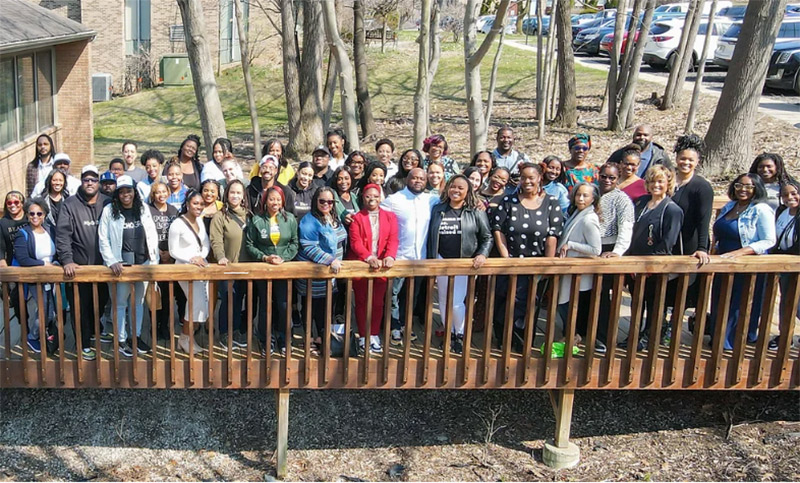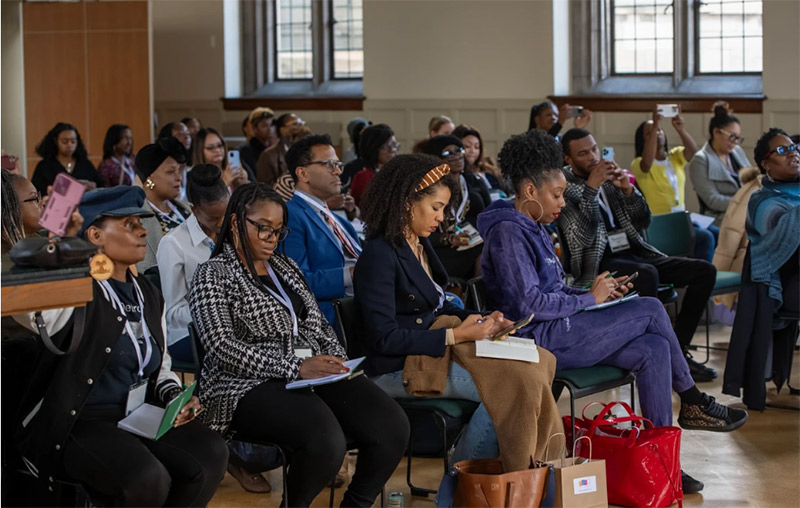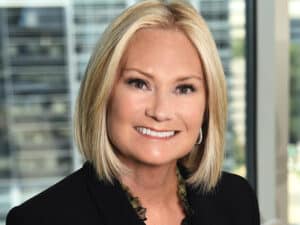Racheal Allen’s journey to entrepreneurship is far from conventional. Having experienced financial insecurity growing up, she initially resisted the entrepreneurial path. However, despite her early reservations, Racheal found herself irresistibly drawn to the business world. And today, she is a fiercely passionate advocate for small business owners.
As the founder of Operations School, a non-profit organization based in Detroit, Racheal is dedicated to educating thousands of minority women on the intricacies of starting and operating a small business. Her guidance extends beyond the classroom, as she supports these budding entrepreneurs as they navigate the challenges of business growth.
I had the opportunity to interview Racheal, and she offered invaluable insights into the realities of establishing a competitive startup. She delves into the practical steps necessary to build a solid business foundation. And, she also discusses the common struggles small and medium-sized business owners face and the gaps in their understanding that often lead to setbacks.
Join us as Racheal shares her personal experiences, lessons learned, and her vision for empowering minority entrepreneurs.
Can you share a little about your journey from being reluctant to entrepreneurship to becoming a successful serial entrepreneur?
Racheal Allen: As a second-generation entrepreneur, I watched my mother take on entrepreneurship since I was ten years old. We experienced housing insecurity and grew up in poverty, which sadly became all things I then associated with entrepreneurship. I didn’t want the uncertainty and vowed never to become an entrepreneur.
However, by the time I was 21 years old, I had started an insurance agency and became a top-producing agent within a year. Over the last twenty years, I have launched startups in the legal services, beauty, real estate, and consulting industries.
As I began personally navigating the small business ecosystem, I realized that entrepreneurs of color needed access to more education, resources, and training due to systemic barriers that continue to keep the playing field unleveled. Working to remedy these challenges has allowed me to scale multiple initiatives that specifically focus on allowing governments, municipalities, and foundations to help minority entrepreneurs succeed.
What inspired you to create the non-profit Operations School in Detroit, and what is its main mission?
Racheal Allen: As a startup founder, I recognized an unmet need in the ecosystem when I realized that many places taught entrepreneurs how to start a business, but there was nowhere you could go to learn how to maintain it.
In 2019, I founded Operations School, where our mission is to train, empower, and equip startup and nonprofit leaders with the skills to successfully manage and scale their operations.
In 2022, I created Centric Place, a first-of-its-kind hub for Black arts, culture, and entrepreneurship that serves as a place for connection, collaboration, and community. I’m truly passionate about helping BIPOC entrepreneurs avoid the challenges I grew up witnessing and experienced as a new entrepreneur.

You’ve helped thousands of underserved minority women entrepreneurs through Operations School. Can you share a story of an individual whose business you’ve seen transform through your program?
Racheal Allen: The true privilege of doing this work has been seeing how our students have transformed and grown their businesses with our support.
Cathryn Coleman of Bouncing Around the Motor City is creating the first party, event rental, and balloon store in Detroit and shares that after attending every entrepreneurial program in the city, Operations School was the first program that taught her how to put everything she’d learned into practice. After completing O School, Cathryn won a $100,000 pitch contest.
There are so many other women who have opened their own brick-and-mortar spaces, scaled their products into new markets, or released businesses that no longer served them.
Many small business owners struggle with legalizing and making their businesses operational. What are some common roadblocks they face, and how do you advise them to overcome these?
Racheal Allen: According to recent studies, 50% of small businesses fail within the first 5 years. Many of these small business owners start with a great idea but struggle to manage common operational roadblocks, such as scaling a business, managing finances, pricing, or setting a clear vision for their brand.
Motivated to change this statistic, I drew from my personal experience as an entrepreneur and founded Operations School, which provides aspiring minority startup leaders with the skills, training, and resources to create a successful small business. My 6-week program, “Get Your Business Legit”, addresses how to overcome the greatest challenges small business owners face.
For instance, the business structure selected will impact risk and financial management. To help with this, small business owners need to ask themselves:
- What are your future goals for this business?
- How involved do you want to be?
- Are you looking to hire more employees?
- Are you looking to consult a lawyer or accountant?
- How much will it actually cost to bring your vision into reality?
Another piece of advice I offer small business owners is to open a business banking account. Separating personal and business finances is key when tracking a business’s cash flow, credit history, expenses, and overall performance. It can also be a lifesaver when protecting one’s personal assets.
Finally, no matter the business size, I encourage every entrepreneur to invest in insurance. In a recent study by Hiscox USA, a leading small business insurer, results show that 75% of small businesses are underinsured, and over 70% do not understand what business insurance covers. Running an unprotected business is a risky decision that could lead to a financial catastrophe.

How do you teach business owners about the importance of branding and establishing a solid brand identity?
Racheal Allen: In O School, I encourage the importance of being yourself and building a brand around who you really are, as our ideal customers can’t find us if we’re pretending to be someone we aren’t.
Small business owners often think they must model the trends other entrepreneurs are following or become inauthentic to promote their brands. I also teach that using branding to make your small business look big includes presenting a cohesive brand identity through your website, social media, and digital assets that prevent anyone from knowing your business is a startup.
What hidden risks do small business owners often overlook that could potentially lead to financial disaster?
Racheal Allen: There are three big hidden risks impacting small businesses at the moment:
- Remote working is here to stay, and with it comes a whole new collection of risks. Working from anywhere means digital vulnerabilities anywhere. Whether it’s working from home, a coffee shop, the airport, or a shared space, Wi-Fi is typically less secure and can provide easy access to any secure information on your device or company network. It’s just as important for small businesses to protect against cyber attacks as it is for large ones.
- There’s also the exploding gig economy, which can provide small businesses with more hiring flexibility. The freelance market alone is expected to grow 15% year-over-year through 2026. It’s often overlooked that when hiring a freelancer or contractor to perform client work, businesses can be liable for issues if a client sues as a result of being given incorrect advice or there is damage to a client’s property. This creates additional risks that businesses are often unaware of.
- Many small businesses are underinsured, 75% of them, in fact, as reported by Hiscox USA. This means that in the event of a lawsuit, businesses are financially and legally liable for the amount beyond their insurance. As the cost of claims can stretch into millions of dollars, these unforeseen costs can spell the end for a small business. Insurance is usually seen as a one-off purchase, and once you have it, you don’t have to change it. Actually, insurance should grow with your business. And, it should be updated every two years at renewal or if your business has changed by 20% or more.

You’ve managed to achieve work-life balance while running multiple ventures. What advice can you give to other entrepreneurs who are struggling with this?
Racheal Allen: The search for work-life balance is ongoing. There will be seasons where work will take up more space than our personal lives, and vice versa.
I encourage entrepreneurs to put in the work that will help them create the work-life balance they desire. This includes structuring our time to reflect our true values. Scheduling what’s important is a way to ensure we are accomplishing what’s important, such as scheduling date night, family time, or setting boundaries around bringing work home.
What are some of the key elements you believe every small business owner should know in order to succeed?
Racheal Allen: All startups require a strong, operational foundation. This includes making sure that your business has the proper legal structure, systems, policies, and procedures in place to grow and become sustainable. Offering a product or service that solves a problem is equally as important because, in a crowded, global marketplace, your intention should be meeting the needs of your customers, not simply making money.
Lastly, every small business owner should leverage technology to ensure consistent delivery of services and customer experiences. Your business should be tech-enabled to allow your customers the ability to interact with your brand 24 hours a day.

Based on your coaching experience, what are some common misconceptions people have about starting and running a small business?
Racheal Allen: The entrepreneurship journey has been glamourized, causing people to think everyone should quit their jobs to pursue their entrepreneurial passions. What is not often articulated is how much entrepreneurship impacts your finances, mental health, relationships, physical health, and more.
I see so many people who believe they want to become an entrepreneur because they don’t want to work for someone else when, in reality, you will work harder for yourself than you ever will in a traditional employment setting.
Lastly, what’s next for you and your business? Are there any upcoming projects or initiatives that you’re particularly excited about?
Racheal Allen: Operations School was recently awarded a grant for $2.8M that will help us expand our programming and deepen our impact with the entrepreneurs we serve. We’re thrilled to be able to launch national programming through our new digital platform that will allow entrepreneurs across the country access to the tools, resources, and community that entrepreneurs need.
Published in Business, Career, Featured Articles, Featured WomenEmily Sprinkle, also known as Emma Loggins, is a designer, marketer, blogger, and speaker. She is the Editor-In-Chief for Women's Business Daily where she pulls from her experience as the CEO and Director of Strategy for Excite Creative Studios, where she specializes in web development, UI/UX design, social media marketing, and overall strategy for her clients.
Emily has also written for CNN, Autotrader, The Guardian, and is also the Editor-In-Chief for the geek lifestyle site FanBolt.com






